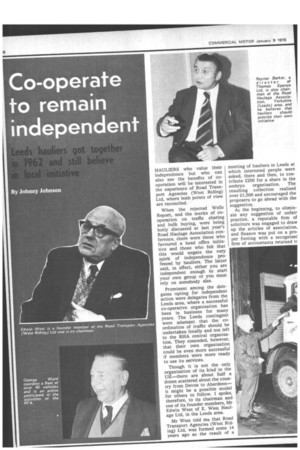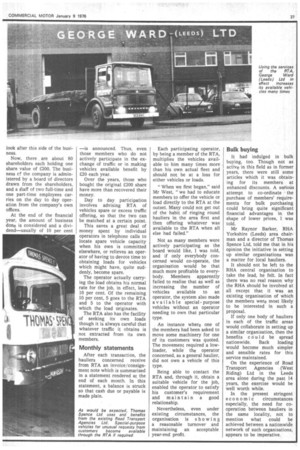Co-operate to remain independent
Page 38

Page 39

If you've noticed an error in this article please click here to report it so we can fix it.
HAULIERS who value their independence but who can also see the benefits of cooperation will be Interested in the experience of Road Transport Agencies (West Riding) Ltd, where both points of view are reconciled.
When the rejected Wells Report, and the merits of cooperation on traffic sharing and bulk buying, were being hotly discussed at last year's Road Haulage Association conference, there were those who favoured a head office initiative and those who felt that this would negate the very spirit of independence professed by hauliers. The latter said, in effect, either you are independent enough to start your own group or you must rely on somebody else.
Prominent among the delegates opting for independent action were delegates from the Leeds area, where a successful co-operative organisation has been in business for many years. The Leeds contingent were adamant that the coordination of traffic should be undertaken locally and not left to the RHA central organisation. They conceded, however, that their own organisation could be even more successful if members were more ready to use its services.
Though it is not the only organisation of its kind in the UK—there are about half a dozen scattered about the country from Devon to Aberdeen— it might be a possible model for others to follow. I spoke, therefore, to its chairman and one of its founder members, Mr Edwin West of E. West Haulage Ltd, in the Leeds area.
Mr West told me that Road Transport Agencies (West Riding) Ltd, was formed some 14 years ago as the result of a meeting of hauliers in Leeds at which interested people were asked, there and then, to contribute £200 for a share in the embryo organisation. The resulting collection realised over £1,500 and encouraged the proposers to go ahead with the suggestion.
At the beginning, to eliminate any suggestion of unfair practice, a reputable firm of solicitors was engaged to draw up the articles of association, and finance was put on a proper footing with a recognised firm of accountants retained tc look after this side of the business.
Now, there are about SO shareholders each holding one share value of £200. The business ef the company is administered by a board of directors drawn from the shareholders, and a staff of two full-time and one part-time employees carries on the day to day operation from the company's own offices.
At the end of the financial year, the amount of business done is considered and a dividend—usually of 10 per cent —is announced. Thus, even those members who do not actively participate in the exchange of traffic or in making vehicles available benefit by £20 each year.
Over the years, those who bought the original £200 share have more than recovered their money.
Day to day participation involves advising RTA of vehicles spare or excess traffic offering, so that the two can be matched at a certain point.
This saves a great deal of money spent by individual operators in telephone calls to locate spare vehicle capacity when his own is committed elsewhere, or relieves an operator of having to devote time to obtaining loads for vehicles which might have, quite suddenly, become spare.
The operator actually carrying the load obtains his normal rate for the job, in effect, less 10 per cent. Of the remaining 10 per cent, 5 goes to the RTA and 5 to the operator with which the load originates.
The RTA also has the facility of seeking its own loads though it is always careful that whatever traffic it obtains is not extracted from its own members.
Monthly statements
After each transaction, the hauliers concerned receive from RTA an invoice/consignment note which is summarised in a statement rendered at the end of each month. In this statement, a balance is struck so that cash due or payable is made plain. Each participating operator, by being a member of the RTA, multiplies the vehicles available to him many times more than his own actual fleet and should not. be at a loss for either vehicles or loads.
"When we first began," said Mr West, "we had to educate members to offer the vehicle or load directly to the RTA at the outset. Many could not get out of the habit of ringing round hauliers in the area first and then offering whatever was available to the RTA when all else had failed."
Not as many members were actively participating as the board would like, I was told, and if only everybody concerned would co-operate, the organisation would be that much more profitable to everybody. Members apparently failed to realise that as well as increasing the number of vehicles available to an operator, the system also made available special-purpose vehicles without an operator needing to own that particular type.
An instance where one of the members had been asked to move some machinery for one of its customers was quoted. The movement required a lowloader, while the operator concerned, as a general haulier, did not own a vehicle of this type.
Being able to contact the RTA and, through it, obtain a suitable vehicle for the job, enabled the operator to satisfy his customer's requirement and maintain a good relationship.
Nevertheless, even under existing circumstances, the organisation is showing a reasonable turnover and maintaining an acceptable year-end profit.
Bulk buying
It had indulged in bulk buying, too. Though not as active in this field as in former years, there were still some articles which it was obtaining for its members at enhanced discounts. A serious attempt to co-ordinate the purchase of members' requirements for bulk purchasing could bring quite significant financial advantages in the shape of lower prices, I was told.
Mr Raynor Barker, RHA Yorkshire (Leeds) area chairman and a director of Thomas Spence Ltd, told me that in his opinion the initiative in setting up similar organisations was a matter for local hauliers.
It should not be left to the RHA central organisation to take the lead, he felt. In fact there was no real reason why the RHA should be involved at all except that it was an existing organisation of which the members were most likely to be interested in such a proposal.
If only one body of hauliers in each of the traffic areas would collaborate in setting up a similar organisation, then the benefits could be spread nationwide. Back loading would become much simpler and sensible rates for this service maintained.
On the experience of Road Transport Agencies (West Riding) Ltd in the Leeds area alone during the past 14 years, the exercise would be well worth while.
In the present stringent economic circumstances especially, the need for cooperation between hauliers in the same locality, not to mention what could be achieved between a nationwide network of such organisations, appears to be imperative.




















































































